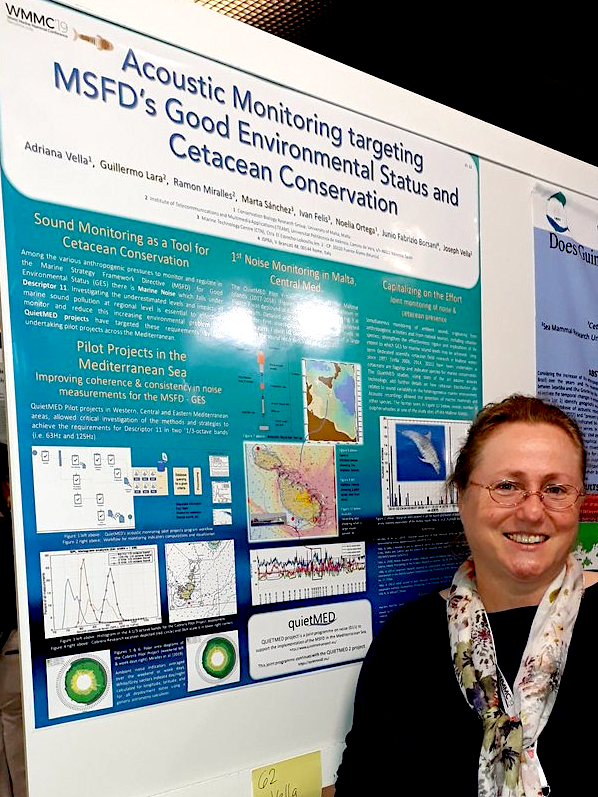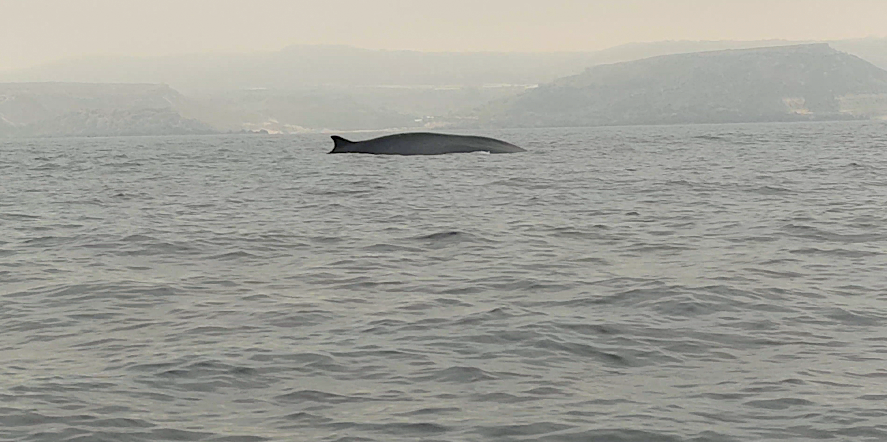Many may be surprised to learn that Fin whales or Sperm whales can be found in Maltese waters. However, through many years of dedicated research and awareness, this surprise has been decreasing, and a greater appreciation of Malta’s biodiversity has been picking up. Prof Adriana Vella is a dedicated field scientist who has greatly contributed to this and was the first to scientifically record whales in Maltese waters through her long-term field research running since 1996.

Prof Adriana Vella, conservation biologist, cetacean researcher, lead academic researcher of the Conservation Biology Research Group at the University of Malta, and founder of the Biological Conservation Research Foundation (BICREF, ngo), has dedicated many years of her life to studying the various species of cetaceans in Maltese waters and beyond – including the study of the presence and distribution of the 20m long, toothed Sperm whales and the 27m long Fin whales. This means spending many days out at sea to undertake scientific research with her research team and BICREF volunteers’ support.

The study of cetaceans (dolphins and whales) is expensive on time, human effort and funds. All challenges that Prof Vella has constantly worked to surmount therefore allowing discoveries to be made which scientifically confirmed various cetacean species in Maltese waters with many of these being residents in the central Mediterranean Sea.
In general, most people consider our sea as beautiful and home to millions of species, still waiting to be discovered or better understood and conserved for future generations.
Even dolphins and whales, like turtles and sea birds, suffer from various forms of pollution, which goes beyond plastics and fishing gear debris. Noise pollution, vessel traffic, deep water explorations, seabed surveys using strong and inappropriate sonar technology may have potentially harmful impacts on cetaceans. These impacts may cost them their lives.
The Marine Strategy Framework Directive (MSFD) is the EU’s requirement toward improving marine environmental quality to reach the best standards. Noise in our seas features as one indicator to monitor according to the MSFD to reach good environmental quality.
So while whales may be an unforgettable sight for many, many forget all that is so necessary for their survival. The need to support and dedicate funds to continue to sustain scientific research of these charismatic but also essential indicator species of our sea’s health should be remembered.
Prof Vella has for many years now expressed her concern on the increasing number of jet skis and powerboats that go far out and at fast speeds, disrupting marine animal activity and causing injury. Dolphins, turtles and whales with scares on their backs through such encounters are increasing. She has been involved in acoustic monitoring of noise in Maltese waters, therefore, pioneering another important aspect for marine conservation.
The BICREF NGO has been supporting essential scientific knowledge to grow in many ways to support marine conservation. From directing volunteers and funds to sustain research to organising international conferences and workshops that have attracted scientists to share their knowledge of these species’ plight in the Mediterranean and world.
Everyone can contribute in one way or another to supporting marine conservation and even passing on the vital message that in case of sightings of whales and dolphins, one should need to keep a reasonably safe distance of a minimum of 100m from these creatures respecting their needs. You need to give whales, dolphins and turtles that come up to the surface to breathe and bask space the time to behave normally.

In 2007, Prof AdrianaVella had recorded Fin whales, the second largest whale species in the world, in Maltese coastal waters. Since then, such records have been regularly taken note of by this cetacean researcher, who has been able to bring to the fore the dolphin and whales present in these waters. She has also been and still is instrumental in promoting these marine mammals science and conservation awareness, improving measures to safeguard these species at the Mediterranean level. This is one of the photos of Fin whales taken by Adriana during her own research work.
The Transport Malta and the Armed Forces of Malta have kindly assisted in this long-term conservation research effort. They are thus acknowledged for their long-term dedication to science for conservation.
Anyone wishing to support cetacean or marine conservation may direct their sighting information to supplement ongoing dedicated conservation efforts for these species. Simply send an email with images and information to bicref@gmail.com or adriana.vella@um.edu.mt
BICREF thanks all those that kindly contribute their sighting records to this long-term, non-profit conservation research and awareness, which has been ongoing in Maltese waters not to promote itself but to promote the conservation needs of these vulnerable species in our waters.
For some of the interesting reads/news clips that have been issued through time, click the following titles :
- COVID 19 may help us understand what it means for marine life to suffer from their own pandemics
- Maltese Marine Conservation Research Efforts extend in Time and Space
- Research on Dolphins and Whales in Maltese Waters published in Nature
- In Discovery of Changing Biodiversity – 25 years of research and awareness
- Research on Underwater Noise and its Impacts to Cetaceans: World Marine Mammal Conference participation


